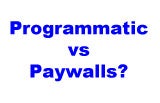 For the past year, the New York Times Co. has been faced with declining digital ad revenues at its flagship newspaper and ancillary properties.
For the past year, the New York Times Co. has been faced with declining digital ad revenues at its flagship newspaper and ancillary properties.
For much of that time, the company has pointed to the weak economy and to the problems at the About Group. With About, which had been unable to reverse falling revenue from cost-per-click ads after Google refined its search algorithms over a year ago, jettisoned in a $300 million deal, the company has found a new reason for its falling ad dollars: the rise programmatic buying and real-time bidding.
However, it’s reasonable to suggest that the success the newspaper company has had in building its paywall subscriptions could be a double-edged sword, that although producing incremental circulation dollars could also be holding back traffic and the ad spending that is tied to its audience.
Profit at the NYTCo dropped 85 percent from the year before, while revenue fell 0.6 percent from Q3 2011, when things appeared to be on upswing for the company. Total ad dollars dropped 9 percent year-over-year, and were down 4 percent in July, 11 percent in both August and September.
Digital advertising revenues slipped 2.2 percent to $44.6 million, primarily because of lower national display and real estate classified advertising revenues.
In a conference call with analysts following the release of its Q3 earnings on Thursday, CFO James Follo laid it all out in a statement that attributed the revenue fall off to the weak economic climate.
“Standard Web-based digital display advertising has been experiencing challenges, including a glut of available ad inventory and the resulting downward price pressure, as well as a shift toward ad exchanges, real-time bidding and all the programmatic buying channels that allow advertisers to buy audiences at scale, including through platforms owned or operated by Google and Yahoo,” Follo said, according to the Seeking Alpha transcript.
Separately, by the end of Q3, the Times Media Group, the unit that houses the NYT, the International Herald Tribune and the Boston Globe/Boston.com properties, had approximately 566,000 paid digital subscribers, up 57,000 or 11 percent from the end of the second quarter.
As the WSJ’s Keach Hagey pointed out last April, the amount of “free, ad-supported” articles were cut back from 20 to 10 per month for individuals. Between March and September, the number of unique visitors slid 16 percent to 25.9 million in September, according to comScore figures. A NYTCo rep told the WSJ the comScore data “doesn’t account for readers’ migration across platforms and that the company isn’t concerned about a decline in traffic because of the tightened paywall.”
Perhaps that is just a coincidence. But if the trends keep going the way they have been, the NYTCo’s incoming CEO Mark Thompson — currently embroiled in a scandal at his former employer, the BBC — may want to consider taking a look at the balance between ad revenue and paywall subscription dollars coming in.












